
The Orange Free State was an independent Boer sovereign republic under British suzerainty in Southern Africa during the second half of the 19th century, which ceased to exist after it was defeated and surrendered to the British Empire at the end of the Second Boer War in 1902. It is one of the three historical precursors to the present-day Free State province.

Khoekhoe, Khoikhoi or KHOI as known today. are the traditionally nomadic pastoralist indigenous population of South Africa. They are often grouped with the hunter-gatherer San peoples. The designation "Khoekhoe" is actually a kare or praise address, not an ethnic endonym, but it has been used in the literature as an ethnic term for Khoe-speaking peoples of Southern Africa, particularly pastoralist groups, such as the !Ora, !Gona, Nama, Xiri and ǂNūkhoe nations.

The Griquas is a subgroup of mixed race heterogeneous former Khoe-speaking nations in Southern Africa with a unique origin in the early history of the Dutch Cape Colony. Under apartheid, they were given a special racial people classification under the broader category of "Coloured". They are Cape Coloureds who participated in the Great Trek, forming "Griqua States".

Griqualand West is an area of central South Africa with an area of 40,000 km2 that now forms part of the Northern Cape Province. It was inhabited by the Griqua people – a semi-nomadic, Afrikaans-speaking nation of mixed-race origin, who established several states outside the expanding frontier of the Cape Colony. It was also inhabited by the pre-existing Tswana and Khoisan peoples.

Griqualand East, officially known as New Griqualand, was one of four short-lived Griqua states in Southern Africa from the early 1860s until the late 1870s and was located between the Umzimkulu and Kinira Rivers, south of the Sotho Kingdom.
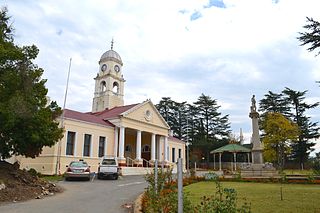
Kokstad is a town in the Harry Gwala District Municipality of KwaZulu-Natal Province, South Africa. Kokstad is named after the Griqua chief Adam Kok III who settled here in 1863. Kokstad is the capital town of the East Griqualand region, as it is also the biggest town in this region. It was built around Mount Currie, a local mountain range, by the city's founder Adam Kok III, for whom the town is named. Stad is the Dutch and Afrikaans word for "city".

Philippolis is a town in the Free State province of South Africa. The town is the birthplace of many South African celebrities including the writer and intellectual Sir Laurens van der Post, actress Brümilda van Rensburg and Springboks rugby player Adriaan Strauss. It is regarded as one of the first colonial settlements in the Free State.

Campbell is a small town situated on the edge of the Ghaap Plateau in the Northern Cape province of South Africa. It is located 48 km east of Griquatown on the N8 road. It was originally known as Knovel Valley and then Groote Fontein, but was renamed in honour of the Reverend John Campbell who visited the Cape Colony in 1813.

Griekwastad is a country town in South Africa. It is sometimes still called Griquatown, a name which is now considered historical. The town is on the N8 road in the Northern Cape Province of South Africa 168 kilometres (104 mi) by road west from the city of Kimberley. It was the first town to be established in the country north of the Orange River.
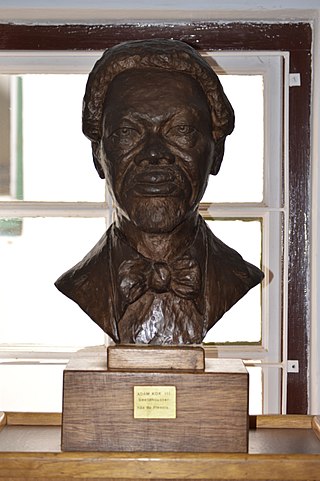
Adam Kok III was a leader of the Griqua people in South Africa.
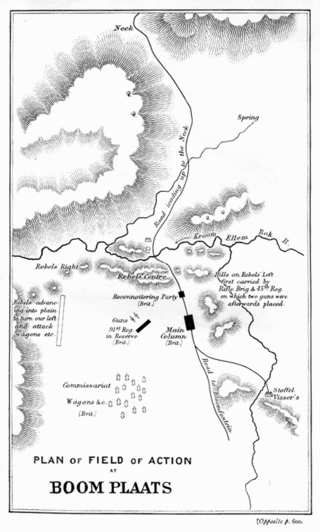
The Battle of Boomplaats was fought near Jagersfontein at 29°50′53.47″S25°38′56.54″E on 29 August 1848 between the British and the Voortrekkers. The British were led by Sir Harry Smith, while the Boers were led by Andries Pretorius. The British were victorious after one Boer opened fire too early and betrayed their position.

The Orange River Sovereignty (1848–1854) was a short-lived political entity between the Orange and Vaal rivers in Southern Africa, a region known informally as Transorangia. In 1854, it became the Orange Free State, and is now the Free State province of South Africa.

William Anderson was an English Christian missionary who relocated to South Africa under the auspices of the London Missionary Society. He was one of the earliest missionaries in the region. Anderson was instrumental in the foundation of the South African town Griquatown.
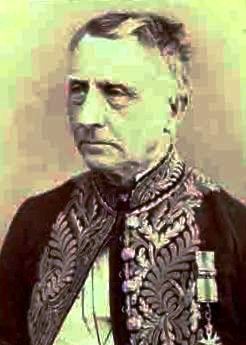
Sir Richard Southey was a British colonial administrator, cabinet minister and landowner in South Africa.
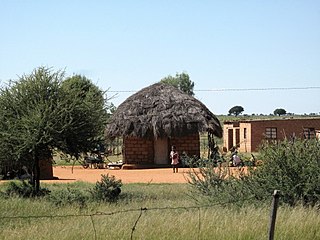
Dithakong is the name of a place east of Kuruman in the Northern Cape, South Africa, which had been a major destination for several of the earliest nineteenth century expeditions from the Cape to the interior of the subcontinent. In colonial literature the name is often rendered in such ways as Litakun, also Litakoo or Lattakoo.

Daniëlskuil is a town in ZF Mgcawu District Municipality in the Northern Cape province of South Africa.

Justice Andries Stockenström, second son of Sir Andries Stockenström, was an influential judge in the Cape Colony. He was appointed Attorney-General of the Cape in 1877, but died soon after his appointment at the age of 36.

The Griqualand West Annexation Act, was the act, passed in the Cape Colony Parliament on 27 July 1877, authorising the union of the Cape Colony with Griqualand West.

Nic(h)olaas Waterboer was a leader ("Kaptijn") of the Griqua people.
Corneli(u)s Kok II was a leader ("captain") of the Griqua people in South Africa.




















